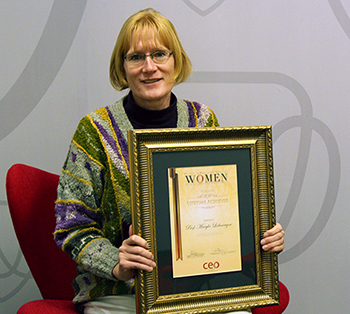Latest News Archive
Please select Category, Year, and then Month to display items
19 November 2018
|
Story Charlene Stanley
|
Photo Charlene Stanley
 Prof John Mubangizi, Dean of the Faculty of Law, encouraged delegates at the Fifth Annual International Mercantile Conference to share ideas on best international practice in their various fields.
Prof John Mubangizi, Dean of the Faculty of Law, encouraged delegates at the Fifth Annual International Mercantile Conference to share ideas on best international practice in their various fields.
“Don’t say anything online that you wouldn’t want plastered on a billboard with your face on it.”
This famous quote by international tech expert Erin Bury should be a guiding light when it comes to online habits in the workplace, according to Francois Cilliers, UFS Lecturer in Mercantile Law.
In his presentation Could Social Media be the Gateway to Employment Discrimination? he warned that employees have a responsibility not to bring their employers in disrepute through their comments on social media.
“Posts, updates, tweets, and comments are considered to be publications and can therefore never be seen as privileged information,” he explained.
Responsibility on employees and employers alike
He pointed out that employers also had a responsibility regarding the way in which they use the information about prospective employees obtained via social media.
“Nowadays, approximately 75% of companies hire through social media. In the US, recruiting companies spend hours researching candidates, making full use of what they can find on social media. It was found that 50–80% of employers frowned upon posts and pictures featuring drug and alcohol abuse, profanity, and bad grammar.”
He warned that employers needed to tread lightly, as a decision not to employ someone as a result of information on the prospective employee’s political views and sexual orientation could constitute unfair discrimination as set out in the Employment Equity Act.
“An employer who wishes to use a screening process (utilising social media) has to prove that the information and the process is objectively necessary and can be justified with reference to the inherent requirements of the job,” he explained.
“As technology and electronic systems advance, so too should the applicable labour laws.”
Cilliers’ presentation formed part of the Fifth Annual International Mercantile Law Conference recently hosted by the Faculty of Law on the Bloemfontein Campus.
Incorporating new technology in teaching and research
“This conference is an opportunity to share ideas on best practice in what is perceived as a ‘difficult’ field within Law,” said Prof John Mubangizi, Dean of the Faculty of Law, as he opened the proceedings. Topics in the discussion sessions ranged from Racism in the workplace and The underrepresentation of females in the judiciary, to Decriminalisation of cannabis: A recipe for healthy employer-employee relations?
“Conferences such as these help us to take advantage of the newest developments in technology to advance our teaching and research,” said Prof Mubangizi.
“To quote Einstein: ‘We can’t solve problems by using the same kind of thinking we used when we created them.’”
Researcher in Plant Breeding one of nine women on the African continent to receive acknowledgement for work in food security
2015-08-04

Prof Maryke Labuschagne |
Prof Maryke Labuschagne, Plant Breeding researcher in the Department of Plant Sciences at the University of the Free State (UFS), is one of only nine women on the African continent to receive the prestigious ‘Country Lifetime Achiever Award’ from Africa’s Most Influential Women in Business and Government Programme (MIW) this year.
During a breakfast event, CEO Communications recognised the Most Influential Women in SADC South who are Building Nations. The event took place at the Vodacom Dome in Midrand on 28 July 2015.
She received the award for her commitment and continuous contributions to food security. “I am concerned about this. We need to develop people who can go into Africa to work together for food security on the continent,” says Prof Labuschagne.
Prof Labuschagne and her students’ research focuses on the genetic improvement of food security crops in Africa, including such staples as maize and cassava. “These crops are genetically improved for yield, drought tolerance, disease, and insect resistance, as well nutritional value.”
“Food security is one of the key factors for stability and prosperity on the continent,” she says.
Apart from the fact that her research is helping to provide food for thousands of people on the continent, she is also an NRF-rated researcher, and author or co-author of over 160 articles in accredited journals.
This is not the firstaward that Prof Labuschagne has received for her work. In 2008, she was chosen as the National Agriculturalist of the Year by the Agricultural Writers Association of South Africa. In 2012, she received the Researcher of the Year award from Grain South Africa, as well as the African Union’s Kwame Nkrumah Science Award for Life Sciences on the continent.
The Country Lifetime Achiever Award is a prestigious award that recognises and honours the lifelong efforts, achievements, and contributions by individuals in their local communities. This recognition covers all sectors and countries, to create a platform where the work and involvement of extraordinary people can be displayed and noted.
About the award, Prof Labuschagne says: “It is always great to be recognised for your work.”
Elana Meyer (athlete) and Thuli Madonsela (Public Protector and advocate) have also received awards from the programme this year.